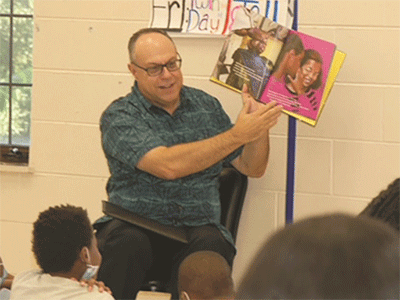St. Mark United Methodist Church in Chicago’s Chatham neighborhood has been especially busy this summer. Some of its rooms were buzzing with the sound of children dancing, moving, or discussing a story they heard read aloud that day. After lunch, though, the building would settle into 15 minutes of stillness, when children and adults were quietly reading.
St Mark United Methodist Church is a part of the Northern Illinois Annual Conference.
So passed a lively July and August in Freedom School.
Initiating a Children’s Defense Fund Freedom School at St. Mark “is a longtime dream of mine,” says Rev. Pamela Pirtle, an assistant pastor at the church. She oversees administrative and strategic leadership at the church.
The seven-week summer program is a continuation of the after-school sessions held at St. Mark during the previous academic year. The 46 summer scholars ranged in grades from kindergarten through high school. They came to receive a healthy, safe, moral, and fair head-start in life and successful passage to adulthood, with the help of caring families and communities, explains the CDF website. At the heart of the program is instruction that encourages children and youth to become independent thinkers, problem solvers, and agents of change in their own communities, the organization says.

Strengthening literacy is one of the primary avenues through which the schools meet their goals for the young scholars, so quite a bit of the program focuses on developing the skills and enjoyment of reading.
Scholars met at St. Mark five days a week and start with a 9 a.m. breakfast. The youngsters then moved into harambe (a Swahili word that roughly translates as “all pulling together”), during which they listened to a book read aloud by a guest reader. The morning sessions are guided by CDF curriculum, which develops scholars’ critical thinking skills and invites them to contribute ideas to the group discussion. They also take part in hands-on activities.
Following lunch came the quiet reading time. After that, various guest experts offered workshops in the afternoon. Rev. Pirtle lists a chef, photographers, musicians, gardeners, and social-movement therapists among the many leaders who have engaged scholars in these activities.
Fridays were particularly fun. On those days, scholars took field trips to museums like the DuSable, Field, and Science and Industry; a community garden, a zoo, and a water park.
St. Mark’s summer program continued the after-school version that the church offered during the 2022-2023 school session. Rev. Pirtle is pleased that St. Mark got to be part of the academic year pilot project.
After only 12 months of sessions, the St. Mark school has already borne remarkable results.
Rev. Pirtle offers an example of a reluctant scholar whose grandmother sent her to Freedom School. The child’s elementary class experience had not been inspiring or encouraging for the child. Today, this formerly reticent student is reading twice as much as she once did and readily offers her ideas about what she has learned and read.
Not all the scholars come in with academic challenges, Rev. Pirtle explains. Some are bright and successful in school. A child who is already an academic achiever may be paired with a child who is struggling and together, they instill more confidence in each other.
Even the college interns are energized by their Freedom School leadership. They receive robust training and through experience come to realize that they have the ability to transform the lives of young people.
Freedom School requires a lot of preparation, assistance, and resources—including meals and snacks for the scholars. Even with this level of investment, the schools are more than worth it, Rev. Pirtle says. Churches are ideal hosts; Freedom Schools demonstrate God’s love profoundly.
Rev. Birkhahn-Rommelfanger agrees. “CDF Freedom Schools at churches are especially wonderful because they already have a community to draw from to create a fantastic program for their context.”
excerpt from a story by Victoria Rebeck, Director of Communications
This story represents how United Methodist local churches through their Annual Conferences are living as Vital Congregations. A vital congregation is the body of Christ making and engaging disciples for the transformation of the world. Vital congregations are shaped by and witnessed through four focus areas: calling and shaping principled Christian leaders; creating and sustaining new places for new people; ministries with poor people and communities; and abundant health for all.





